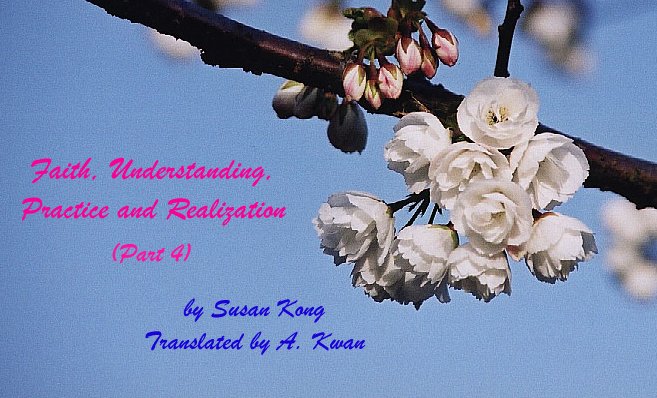|
Depending on every individual's efforts, believing in faith, understanding it, upholding the practice and making contributions yield variable effects. With proper belief in the faith, along with correct comprehension and implementation, one will experience the following:
People very often unconsciously do something useless to themselves, or harmful to others. They do not know how to treasure time and spend their lives playing and fooling around; or even kill, steal and perform other mischief just to satisfy their own needs. Upon believing in and understanding Buddhism, knowing "The Law of Cause and Effect", abiding by the precepts, serving others, being responsible, establishing amiable relationship with other beings, not daring to harm others' lives, property and spoil their integrity, one switches from being destructive to being constructive.
It is easy to commit sins as a result of greed, hatred and delusion. Upon believing in and understanding Buddhism, and having a loving heart, one will be happy when they see others are happy. Do not be jealous or too aggressive and there will be harmony among individuals. A compassionate heart is unwilling to see others suffer, a forgiving heart accepts and pardons the wrongs of others. Making others happy is cultivating good, while liberating others from suffering is eradicating evil. Those nurtured in Buddhism can change bad karma to cultivation in goodness.
Frustration is born in our hearts. Thinking for oneself diminishes the tolerance for others. When dealing with others, sometimes we create frustration due to the conflicts resulting from comparisons, expectations, power and duties. If we believe in Buddhism and understand its theories, we should know that we were all born in the World of Five Turbidities and are deluded by the evil karma. We should help each other to liberate. Eradicate selfishness and encourage one another. Even with our bodies still existing in this world, if our minds are already liberated, we have already changed from frustration to seclusion.
For the beginners in Buddhism, they should aim to be liberated from the On-fire Three Worlds. When they are enlightened from listening, they become more open-minded. As there is no permanent self, we should make use of this single stage of life to make ourselves happy by making others happy. Although the sentient beings are said to be difficult to teach, if ordinary people deal with each other with greed, hatred and delusion, they naturally get frustrated. On the other hand, the Bodhisattva cultivates Himself in the state of interpenetration without obstruction. They do not care even if they encounter different difficult and harsh situations. And this is why they do not stay at the state of Arhat realm, but take liberating others as their mission. That is the compassion revealed from wisdom, and the Bodhisatta practice of changing from Small Vehicle to Great Vehicle.
Whatever one does definitely comes with effects. In the beginning of practising the Bodhisattva way, be alert not to retreat, and act duly in order to make progress. Through making extraordinary efforts, one will act naturally and have merits without deliberation, attain Nirvana switching from being active to inert, and attain Bodhi from being inert to active. That is changing from diligence to realization.
The last two stanzas of the Thirty Mere-consciousness Stanzas describes the ten status of realization as follows: Without attainment and perception, [being] inconceivable and incomprehensive, this is transcendental supramundane wisdom. Because of the abandonment of the crude dross of the two barriers, inner transformation into perfect wisdom is achieved. This is the Pure Dhatsu (the undefiled storehouse realm), which is inconceivable and incomprehensive, good and eternal, where one is in a state of blissfulness with one's emancipated body. This is the Law of "Great Silence", the Dharmaakaya realized by the Great Sakayamuni.
The wisdom of the Buddha is different from the knowledge acquired by ordinary people. Such wisdom cannot be seen, heard, or touched, but only be accessed through the enlightenment and realization by our hearts. It is beyond the mental state through thinking and meditation , and therefore said to be unattainable. The wisdom of the Buddha is not realized externally or from other people. Enlightenment cannot be attained if we are stubborn. The Diamond Sutra states, " In the dwelling of Burning Lamp Buddha, Shakyamuni Buddha had no Dharma of Annutara-samyak-sambodhi" For example, a person who invites you to look at the moon by pointing with his finger cannot give you the moon. If you want to see the moon, you have to raise your head and look towards the direction where his finger points. Everything springs from your own initiatives and awareness.
The noumena (absolute truth) is comprehended by wisdom. The internally realized truth cannot be described by ordinary ideas, nor can it be explained and discussed with common words. Relying on our own impressions, we describe relative matters and things with form and shape by ordinary ideas and words. Absolute noumena, however, can only be conceived in mind nor by words. There is nothing surreal or secretive about it. All impressions arisen from the mind of differentiation are, like dreams, unreal and not practical. The Diamond Sutra states, "All matters with a form are unreal."
Worldly wisdom teaches people to adapt to the environment for survival. Mathematics, physics, physiology, psychology and ethics base entirely on observations on matters or emotions and feelings of individuals to explain the motives for certain behaviour. They cannot observe deeply the fundamental law of causes and conditions, causes and effects, or the ways to liberation. If we can contemplate the self and the dharma, thoroughly understand its falseness, and detach from the delusion of real existence, then we can transcend beyond materials. This can lead us to transcend from being ordinary people to sagely ones, and to liberate from any attachments. This is the transcendental worldly wisdom.
For all years long, people have the bad habits inherited in their mind. They will react naturally at any time under the evil environment. That will obstruct their way in cultivation. Though a practitioner makes vow to do good and eradicate evil, he has the flame of greed if he does nor reach a state of no-return in cultivation. Thus, when he comes across the evil conditions, he can be burnt by the fire of greed. If he has hatred, his forest of merits and virtues is easily swallowed by the fire of ignorance. He should protect and guard their mind internally at all times, just like pure gold refined from gold ore is not scared of fire in stove. If If we clear the obstruction of affliction and understand the Dharma and its meanings, we get the power of argung without being stubbed in debate. We can travel everywhere and preach, clear all the obstruction of what is learned, change the karma effect of birth and death to the transformed body at our own discretion.
With respect to our own mind, we cultivate till no evil thought arises and no evil deed is performed. Thus, we leave no evil seed. With respect to dealing with others, our mind is full of kindness, compassion, delight and renunciation. We have not a thought of greed and hatred whether it accords with or resist against any conditions. We are different from ordinary people, who cling to the phenomena and material in the external world, who love and hate at their own will and who put the seed of greed and hatred in the internal mind. As the seeds are accumulated more and more, they incur suffering as a result. For the Buddha, he accumulates no defilement, no incompleteness, thus leaves no seed of incurring the result of birth and death.
In the eyes of Buddha, the sentient beings are not conscious about their self value. They are influenced by the external matters. They are unhappy all day, and tortured themselves. With the heart of great compassion, the Buddha has mercy or sentient beings, he teaches them, so that they can review themselves and conquer the thought of stupidity and delusion. Though the Buddha has no solid things given to the sentient beings, they can help the sentient beings to explore the wonderful uses of their mind. It is even better than a treasure as it can be used in all our lives.
The principles that the Buddha enlightens are ordinary there. It is not innovative, thus it is suitable for passing along in next generations, and applicable to propagating in ten directions. The Buddha has cut all afflictions. He has no staged cycle of birth and death. He can transform and appear in billion different bodies at his own will under certain conditions, then does whatever he should do in unlimited and endless future.
With his profound contemplation wisdom, the Buddha perceives the truth. He has no affliction inherent from birth nor affliction arising from the discriminating mind. He is not annoyed by the past, not vexed at the present and not worried about the future. He can enjoy comfortably the bliss of nature/Dharma.
People who discriminate self and others usually are mean. Contemplating that all sentient beings are equal, the Buddha has no mark of self, no mark of people; no mark of self, no mark of people; no mark of sentient beings, no mark of the living ones. Delivering the sentient beings, the Buddha does not cling to the thought that "I" deliver, and sentient beings are being delivered. The Buddha does not cling to the Dharma towards all matters. So his mind is free from any stress nor obstruction. He can relax in his own mind, and lead other people to enjoy the bliss of nature as well.
Buddha's heart is bright and pure just like a great round mirror. All phenomena will arise under certain conditions. Like the image in the mirror, it will leave no traces at all. If we realize that all phenomena are unreal, like bubbles and images, then we will depart from delusion and dream. Though our mind which all merits and virtues depend on, is still and calm, it is like a great round mirror, calm but able to illuminate. We should liberate sentient beings pro-actively, but we do not attach to the merits and virtues in this life. We are always in a state of awareness but be calm. That is why it is called unsurpassed calmness. In practicing Buddhism, if one can change one's mind and realize the unsurpassed calmness , it is an effective and true realization in the process of cultivation. |


 People
are selfish and are unaware of the impermanence and unpredictability
of life. They are lost in delusion - wishing those who behave according
to their wishes to stay forever, and those who go against their
wills to disappear as soon as possible. When happenings in life
are not in line with their wishes, they become lost in despair and
disappointment. Upon believing in and understanding Buddhism, one
would understand "The Law of Dependent Origination", which
is out of any individual's control. Never over-emphasize on the
superficial failures and successes in the material world. In order
to have one's wishes come true, one should first form the inner
perception - be calm, understanding, modest, and nothing will be
against your wishes. Without being too demanding on others and your
environment, one changes from confusion to enlightenment.
People
are selfish and are unaware of the impermanence and unpredictability
of life. They are lost in delusion - wishing those who behave according
to their wishes to stay forever, and those who go against their
wills to disappear as soon as possible. When happenings in life
are not in line with their wishes, they become lost in despair and
disappointment. Upon believing in and understanding Buddhism, one
would understand "The Law of Dependent Origination", which
is out of any individual's control. Never over-emphasize on the
superficial failures and successes in the material world. In order
to have one's wishes come true, one should first form the inner
perception - be calm, understanding, modest, and nothing will be
against your wishes. Without being too demanding on others and your
environment, one changes from confusion to enlightenment.


